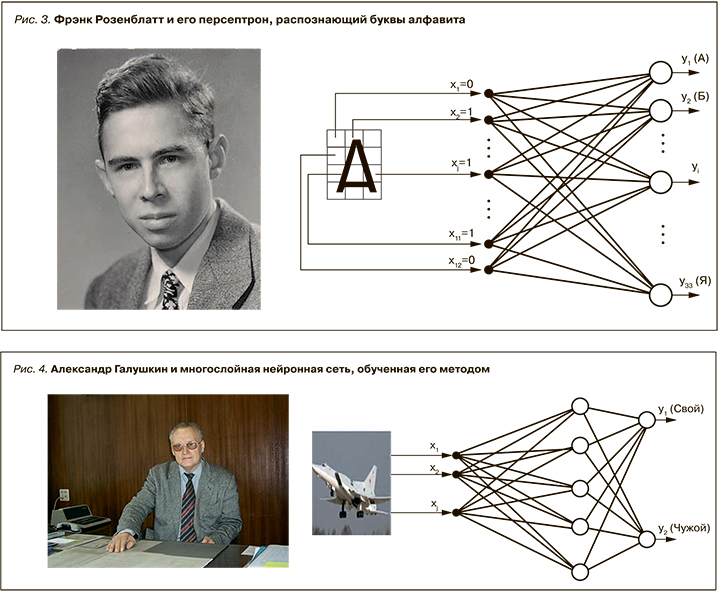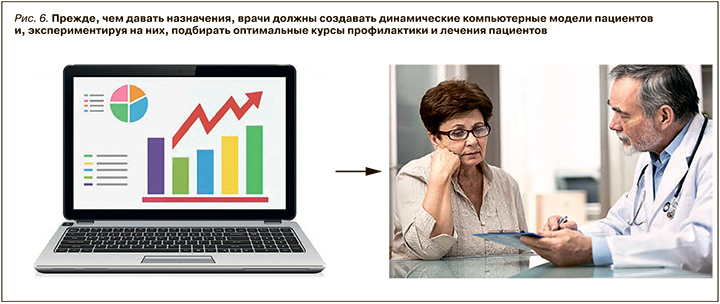В конце прошлого года в Перми с большим успехом прошел Международный евро-азиатский конгресс по вопросам биоэтики, молекулярной и персонализированной медицины «Biomed-inn – 2019». Квинтэссенцией конгресса были пленарные доклады академиков А.Г. Чучалина и В.А. Черешнева, в которых они блестяще охарактеризовали современное состояния медицинской науки, причем оба докладчика связали ее будущие успехи с внедрением методов искусственного интеллекта.
Перспектива внедрения этих методов побуждает нас дополнительно обсудить до сих пор нерешенную этическую проблему взаимоотношений врача и пациента.
В настоящее время врачи, в отличие от представителей технических дисциплин, практически не применяют метод динамического компьютерного моделирования. Если физики и инженеры, прежде чем давать какие-либо рекомендации по увеличению ресурса работы исследуемого объекта, как правило, создают его компьютерную модель, выполняют виртуальные компьютерные эксперименты, наблюдают на экране компьютера за поведением объекта, после чего подбирают оптимальные условия и режимы его эксплуатации, то врачи совершенно не используют метод динамического математического моделирования. Врачи же очень часто назначают курсы лечения и наблюдают непосредственно за пациентом: «поможет или не поможет?». Если «не поможет», назначают другие лекарственные препараты, и снова наблюдают.
Такой метод работы представители технических дисциплин называют экспериментированием «на натурных объектах». Но «натурным объектом» в данном случае является человек.
Получается, что врачи, осознанно или нет, вынуждены экспериментировать на живых людях, что является нарушением первого принципа Нюрнбергского кодекса [1] (рис. 1), а значит, представляет серьезную этическую проблему.
Цель нашей статьи – показать, что методы искусственного интеллекта могут приблизить нас к решению этой проблемы.

ИСКУССТВЕННЫЙ ИНТЕЛЛЕКТ И МЕДИЦИНА
Многие ученые связывают современное состояние медицины и ее будущее с активным внедрением методов «новой» научной отрасли – искусственного интеллекта [2]. Но мало кто из врачей знает, что этой научной отрасли уже… более 700 лет и что первой системой искусственного интеллекта была механическая система медицинской диагностики, созданная испанским ученым Раймундом Луллием в XIII в. (рис. 2). Это открытие (назовем его Открытием № 1) легло в основу технологии экспертных систем, с помощью которой в 1970-х гг. учеными Стэнфордского университета (США) была разработана знаменитая экспертная система медицинской диагностики MYCIN.
Следующим великим открытием (Открытие № 2), пришедшимся на середину XX в., стало изобретение американскими учеными Уорреном МакКаллоком (Warren McCulloch) и Уолтером Питтсем (Walter Pitts) математического нейрона [3], а также создание Фрэнком Розенблаттом (Frank Rosenblatt) персептрона [4], способного распознавать буквы латинского алфавита (рис. 3). Однако попытки практического применения персептрона для создания системы распознавания противника «Свой или Чужой» (этот проект был актуален в США в связи с Карибским кризисом 1962 г.) оказались безуспешными. Потерпели неудачу и попытки создания нейросетевой системы диагностики инфаркта миокарда на основе данных электрокардиограмм.

Причина неудач заключалась в отсутствии эффективного алгоритма обучения многослойных нейронных сетей. Такие алгоритмы были изобретены в 1973 г. российским ученым Александром Галушкиным [5] (Открытие № 3, рис. 4) и независимо от него в 1974 г. американским ученым Полом Вербосом (Paul Werbos) [6].
Открытия № 2 и 3 ознаменовали появление новой технологии искусственного интеллекта – технологии нейронных сетей. Ее преимущество перед технологией экспертных систем состоит в том, что знания предметной области закладываются не автором компьютерной программы, а приобретаются в процессе обучения на практическом опыте (рис. 5). Это свойство нейронных сетей оказалось особенно эффективным в медицине, теоретическая база которой пока далека от совершенства.

В настоящее время для распознавания патологий на рентгеновских снимках большой популярностью пользуются так называемые сверточные нейронные сети. Эти сети обязаны своим появлением японскому ученому Кунихико Фукусиме (Kunihiko Fukushima) [7], который в 1979 г. изобрел способ более полного по сравнению с персептроном учета топологии распознаваемого объекта (Открытие № 4).
В наши дни термин «искусственный интеллект» стал необычайно популярен. В мировой медицинской литературе можно найти десятки сообщений об успешном применении нейронных сетей для диагностики самых различных заболеваний. Помимо термина «нейросетевая диагностика», встречаются сообщения, в которых упоминаются понятия «прогноз заболеваний», «предсказание заболеваний», «оптимизация курсов лечения и профилактики».
Как показано в обзорах, опубликованных в 2018 г. [8, 9], при тщательном ознакомлении с текстами этих публикаций выясняется, что указанные термины используются только в узком смысле этого слова как «исход заболевания», «выживет – не выживет», «какой процент пациентов выживет», «обратится ли пациент вновь к врачу» или как «диагноз, прогнозируемый в неопределенном будущем». А под «оптимизацией» иногда понимается оптимизация стоимости лечения. Сведений же о реальном применении аппарата нейронных сетей для моделирования заболеваний как процессов, развивающихся в организме человека во времени, и тем более для управления этими процессами нам не удалось найти.
Выражаясь математическим языком, можно утверждать, что практически все нейросетевые системы медицинского назначения во всем мире являются статическими. Они не имеют оси времени и поэтому могут ставить диагнозы заболеваний только в текущий момент времени.
В результате врачи в своей практике часто бывают вынуждены применять «метод проб и ошибок». То есть, как уже отмечалось выше, по сути, занимаются экспериментированием «на натурных объектах», которыми в данном случае являются живые люди.
Надо заметить, что представители технических дисциплин широко занимались экспериментированием «на натурных объектах» в прошлые века. Однако в наше время инженеры, прежде чем принять какое-либо техническое решение, как правило, сначала создают компьютерную модель натурного объекта и с помощью виртуального компьютерного экспериментирования изучают, как он поведет себя в тех или иных условиях, какие возникнут неисправности при его эксплуатации и какие меры надо предпринять, чтобы увеличить его ресурс.
Поэтому с точки зрения представителей технических дисциплин прямое экспериментирование на натурных объектах – это анахронизм. Напрашивается вывод, что методологическая база медицинской науки отстала от технических дисциплин более чем на 100 лет.
ПУТИ РЕШЕНИЯ ЭТИЧЕСКОЙ ПРОБЛЕМЫ
Причины сложившейся ситуации вполне объяснимы. Дело в том, что сам объект моделирования – человек – по своей природе несоизмеримо сложнее любого технического объекта, и методы классического моделирования (например, основанные на решении краевых задач математической физики) не дают приемлемых для практического применения результатов.
Здесь нужны принципиально новые подходы, каковыми, по нашему мнению, являются подходы, основанные на развитии и применении методов искусственного интеллекта.
По-видимому, впервые возможности нейронных сетей для прогнозирования развития заболеваний во времени на количественном уровне, а также для подбора оптимальных курсов лечений и образа жизни пациентов, снижающих риски заболеваний, были показаны в публикациях 2013–2018 гг. [8–10]. На основе этих теоретических результатов нами создан демонстрационный прототип интеллектуальной системы KARDIONET, наглядно показывающий, что врачам так же, как и инженерам, иногда можно отказываться от натурного экспериментирования. Прежде чем делать какие-либо назначения больным, врачи могут создавать компьютерные модели пациентов и наблюдать на экране компьютера результаты действия лекарственных препаратов в течение будущих периодов времени. Экспериментируя на компьютерных моделях, врачи, как и инженеры, могут подбирать оптимальные курсы лечения и профилактики заболеваний с учетом особенностей организма пациентов (рис. 6).

По мнению многих специалистов, развиваемый нами подход может произвести настоящую революцию в медицинской науке и практике [11]. Он открывает путь для перехода от все еще применяемого в медицинской практике «экспериментирования на пациентах» к экспериментированию на их компьютерных моделях и, таким образом, для ликвидации отставания медицинской науки от технических дисциплин. Таким образом, упомянутая выше этическая проблема современной медицины может быть решена путем дальнейшего развития и применения методов искусственного интеллекта.
У читателей может возникнуть естественный вопрос: почему о возможностях динамического виртуального экспериментирования не заявляют авторы множества других аналогичных медицинских проектов? Ведь искусственный интеллект в наши дни стал чрезмерно популярен, и разработкой нейросетевых медицинских систем занимаются многие научные коллективы, имеющие большие финансовые и кадровые возможности.
Ответ на этот вопрос заключается в том, что авторы KARDIONET начали заниматься проблемами искусственного интеллекта более 30 лет назад. За это время нами накоплен большой опыт и установлено взаимопонимание между врачами и математиками. Обнаружены и преодолены «подводные камни», препятствовавшие получению положительного результата. Разработаны методические приемы и ноу-хау, которыми современные молодые ученые пока еще не обладают [12].
Демонстрационный прототип системы KARDIONET можно запустить с сайта www KardioNet.ru. Там же есть описание принципа действия системы, инструкция по эксплуатации, видеоролики, демонстрирующие возможности, и история выполнения проекта.
ЗАКЛЮЧЕНИЕ
Подводя итог изложенному, еще раз подчеркнем, что искусственный интеллект и медицина, как и прежде, продолжают находиться в тесной взаимосвязи между собой. Если искусственный интеллект своим появлением на свет в XIII в. был обязан медицине, то в ближайшем будущем следует ожидать, что благодаря развитию и применению методов искусственного интеллекта, в частности нейросетевых динамических систем [8–11], медицинская наука поднимется на качественно новый уровень. Будет решена многовековая и до сих пор нерешенная этическая проблема медицины. Врачам больше не придется прибегать к вынужденному экспериментированию на натурных объектах – пациентах. Оптимальный подбор курсов профилактики и лечения будет производиться путем виртуального прогнозного экспериментирования на динамических компьютерных моделях пациентов, учитывающих их индивидуальные особенности и состояние здоровья.


